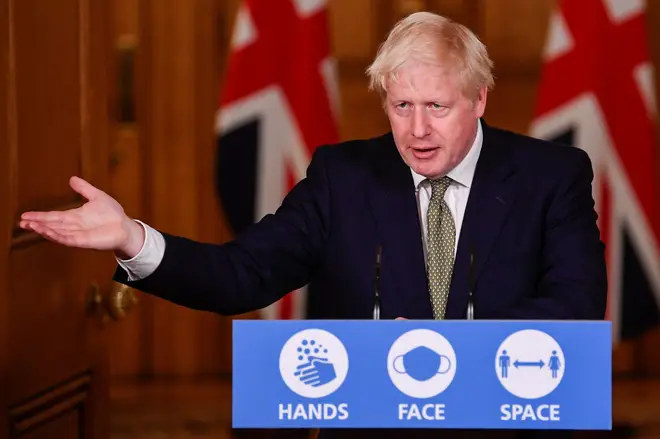
Ali Miraj 6pm - 9pm
12 October 2020, 20:24 | Updated: 12 October 2020, 20:48

The Prime Minister has denied the national lockdown was eased too early in a move that some say damaged the north but favoured the south of England.
Cases in the north of England have soared, with Liverpool being placed under a Tier 3 “very high” lockdown in the new rules announced earlier on Monday.
Boris Johnson confirmed a new Covid alert system which ranks areas under a medium, high or very high lockdown depending on how badly the virus is spreading.
12 areas – all also in the north and Midlands – have been placed under a Tier 2 “high” alert.
Local lockdown postcode checker: How to check your area's Covid-19 alert level and restrictions
Read more: Greater Manchester placed under Tier 2 restrictions
Professor Jonathan Van-Tam said the reason the epidemic has “clearly picked up pace in the North of England earlier than it did in the first wave… almost certainly relates to the fact the disease levels in the North, and certainly in the North West, never dropped as far in the summer as they did in the South.”
But asked if lockdown was lifted too early in the north, and whether it was a decision taken “from London to suit London and the south,” Mr Johnson said: “No, I don’t accept that at all.
“I think the difference between this bout of the pandemic and the first one is how much more localised it is.

Three tier system: LBC explains
"And we took measures on a national basis then at every stage and on the basis of the scientific advice – that’s what we did.”
Professor Jonathan Van-Tam said the rise in coronavirus cases was now being seen "nationwide" and was not solely a problem for northern England.
Addressing a slide shown earlier in Monday’s briefing about rates increasing in the South of England, he said: "You have worried me now that I might have presented a bi-polar picture that Covid-19 is a problem in the North and not a problem in the South.
"On the contrary, the epidemic this time has clearly picked up pace in the North of England earlier than it did in the first wave and that almost certainly relates to the fact the disease levels in the North, and certainly in the North West, never dropped as far in the summer as they did in the South.
"But pretty much all areas of the UK are now seeing growths in the infection rate and that extending brown map that I showed you, which is sourced from the Joint Biosecurity Centre, absolutely makes that point.
"This is a nationwide phenomenon now that rates are changing upwards across the UK."

Boris Johnson explains new "three-tier" local lockdown restrictions
Mr Johnson said areas listed as medium will be subject to the same rules as those which currently apply across the country, such as the rule of six and the 10pm hospitality curfew.
In the high alert level, which will apply to most of the areas already subject to restrictions, household mixing will be banned indoors. Support bubbles will still be permitted, however.
The very high alert level will apply to areas causing the most concern, and social mixing will be prohibited indoors and in private gardens.
Pubs and bars will be closed in the very high alert level areas unless they can operate as a restaurant. People will also be advised against travel in and out of the areas.
The Prime Minister warned regional leaders who are resisting severe new measures that he could impose restrictions regardless of their objections.
He told the Downing Street press conference: "It's absolutely correct to say we're working with local authorities across the country but particularly with those badly affected regions that everybody knows about in the North West and the North East, Yorkshire, Humber and so on, trying to work with them to support a collective package of measures.
NEW: Here are the areas in each of the three tiers - just published. pic.twitter.com/Af36MWCVaG
— Ben Kentish (@BenKentish) October 12, 2020
"The offer is there to all local leaders who are facing problems, big increases in the infection rates, we'll help to support more local test and trace, more local enforcement and so on.
"We stand ready to work with local government at all levels but clearly as national Government we have to think about our primary duty, which is to save life and to protect the NHS and we will also do whatever we think is necessary over the next few days and weeks.
"If we can't get agreement, then clearly it is the duty of national Government to take the necessary action to protect the public and public health and we will."